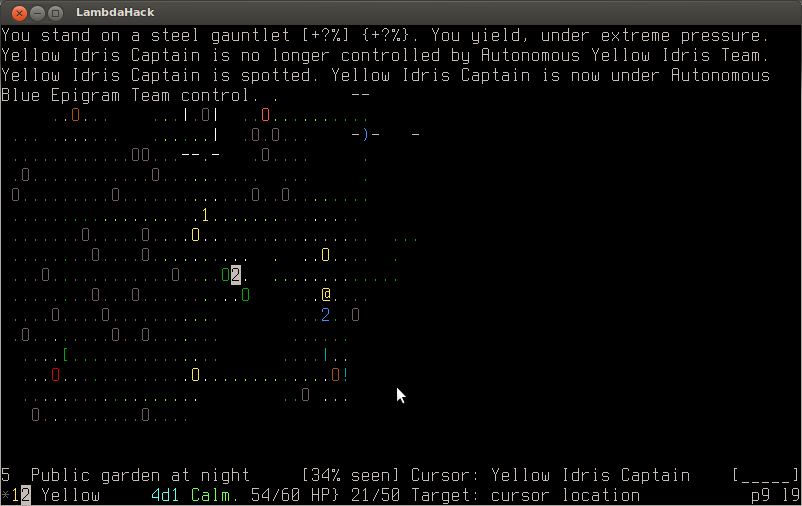Difference between revisions of "LambdaHack"
(Update to v0.2.14) |
|||
| Line 3: | Line 3: | ||
|released = Apr 12, 2008 | |released = Apr 12, 2008 | ||
|relver = 1.20080412 | |relver = 1.20080412 | ||
|updated = | |updated = Jul 25, 2014 (0.2.14) | ||
|updver = 0.2. | |updver = 0.2.14 | ||
|licensing = [[BSD3]] (Free Software) | |licensing = [[BSD3]] (Free Software) | ||
|language = [[Haskell]] | |language = [[Haskell]] | ||
| Line 13: | Line 13: | ||
}} | }} | ||
This is an alpha release of LambdaHack, | This is an alpha release of LambdaHack, a Haskell game engine | ||
a game engine library for roguelike games | library for roguelike games of arbitrary theme, size and complexity, | ||
of arbitrary theme, size and complexity, | packaged together with a small example dungeon crawler. When completed, | ||
packaged together with a small example dungeon crawler. | the engine will let you specify content to be procedurally generated, | ||
When completed, the engine will let you specify content | define the AI behaviour on top of the generic content-independent rules | ||
to be procedurally generated, define the AI behaviour | and compile a ready-to-play game binary, using either the supplied | ||
on top of the generic content-independent rules | or a custom-made main loop. Several frontends are available | ||
and compile a ready-to-play game binary, using either | (GTK is the default) and many other generic engine components | ||
the supplied or a custom-made main loop. | are easily overridden, but the fundamental source of flexibility lies | ||
Several frontends are available (GTK is the default) | in the strict and type-safe separation of code and content and of clients | ||
and many other generic engine components are easily overridden, | (human and AI-controlled) and server. Long-term goals for LambdaHack include | ||
but the fundamental source of flexibility lies | support for multiplayer tactical squad combat, in-game content creation, | ||
in the strict and type-safe separation of code and content | auto-balancing and persistent content modification based on player behaviour. | ||
and of clients (human and AI-controlled) and server. | |||
for | |||
in-game content creation, auto-balancing and persistent | |||
content modification based on player behaviour. | |||
The engine comes with a sample code for a little dungeon crawler, | |||
called LambdaHack and described in PLAYING.md on the official site. | |||
https://raw.githubusercontent.com/LambdaHack/media/master/screenshot/ambush1.png | |||
Revision as of 19:56, 25 July 2014
| LambdaHack | |
|---|---|
| Library project | |
| Developer | Andres Löh, Mikolaj Konarski |
| Released | Apr 12, 2008 |
| Updated | Jul 25, 2014 (0.2.14) |
| Status | Alpha |
| Licensing | BSD3 (Free Software) |
| P. Language | Haskell |
| Platforms | Linux, OSX, Windows |
| Dependencies | as specified on the Hackage page |
| Official site of LambdaHack | |
This is an alpha release of LambdaHack, a Haskell game engine library for roguelike games of arbitrary theme, size and complexity, packaged together with a small example dungeon crawler. When completed, the engine will let you specify content to be procedurally generated, define the AI behaviour on top of the generic content-independent rules and compile a ready-to-play game binary, using either the supplied or a custom-made main loop. Several frontends are available (GTK is the default) and many other generic engine components are easily overridden, but the fundamental source of flexibility lies in the strict and type-safe separation of code and content and of clients (human and AI-controlled) and server. Long-term goals for LambdaHack include support for multiplayer tactical squad combat, in-game content creation, auto-balancing and persistent content modification based on player behaviour.
The engine comes with a sample code for a little dungeon crawler, called LambdaHack and described in PLAYING.md on the official site.
